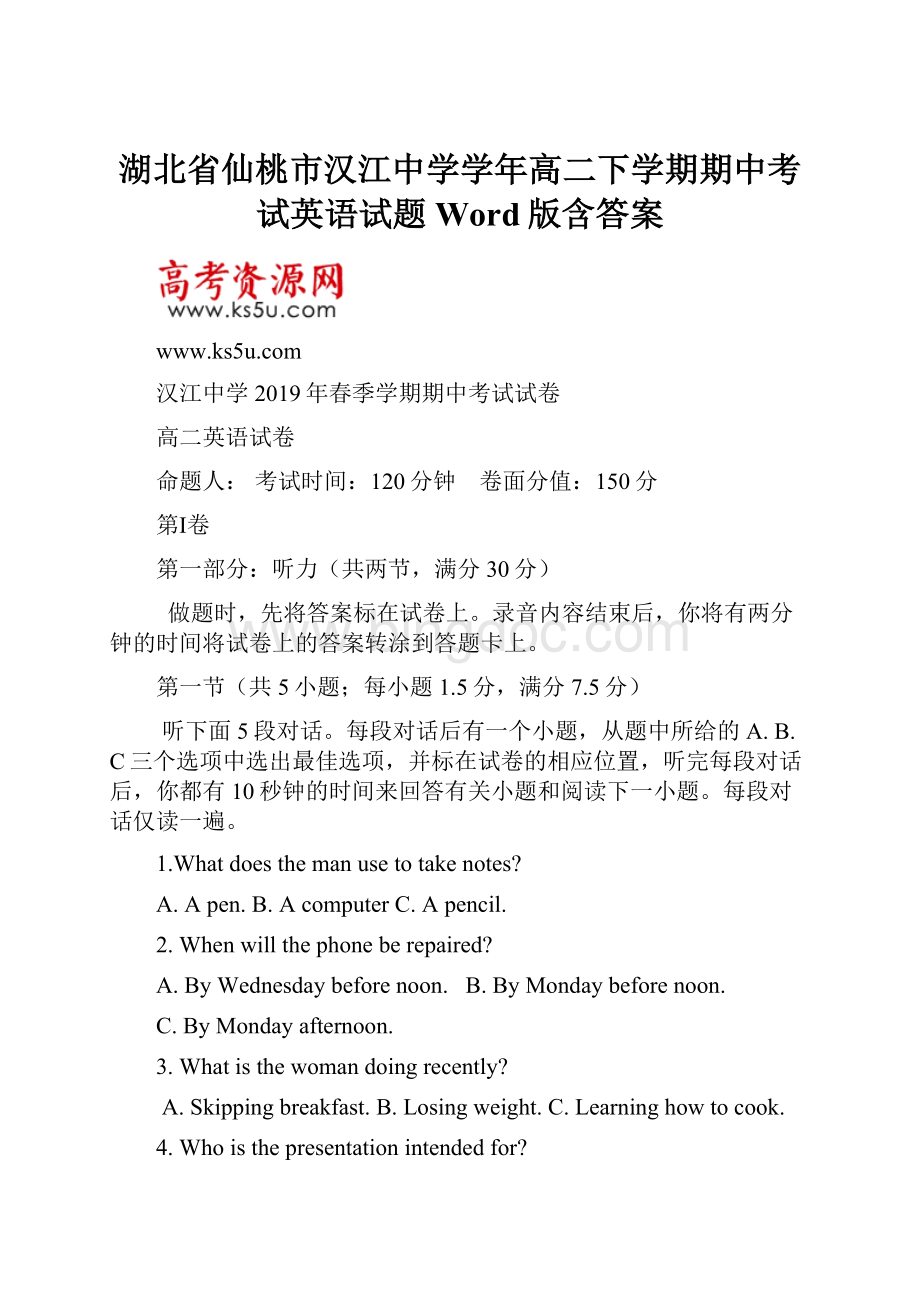湖北省仙桃市汉江中学学年高二下学期期中考试英语试题 Word版含答案.docx
《湖北省仙桃市汉江中学学年高二下学期期中考试英语试题 Word版含答案.docx》由会员分享,可在线阅读,更多相关《湖北省仙桃市汉江中学学年高二下学期期中考试英语试题 Word版含答案.docx(15页珍藏版)》请在冰点文库上搜索。

湖北省仙桃市汉江中学学年高二下学期期中考试英语试题Word版含答案
汉江中学2019年春季学期期中考试试卷
高二英语试卷
命题人:
考试时间:
120分钟 卷面分值:
150分
第Ⅰ卷
第一部分:
听力(共两节,满分30分)
做题时,先将答案标在试卷上。
录音内容结束后,你将有两分钟的时间将试卷上的答案转涂到答题卡上。
第一节(共5小题;每小题1.5分,满分7.5分)
听下面5段对话。
每段对话后有一个小题,从题中所给的A.B.C三个选项中选出最佳选项,并标在试卷的相应位置,听完每段对话后,你都有10秒钟的时间来回答有关小题和阅读下一小题。
每段对话仅读一遍。
1.Whatdoesthemanusetotakenotes?
A.Apen.B.AcomputerC.Apencil.
2.Whenwillthephoneberepaired?
A.ByWednesdaybeforenoon.B.ByMondaybeforenoon.
C.ByMondayafternoon.
3.Whatisthewomandoingrecently?
A.Skippingbreakfast.B.Losingweight.C.Learninghowtocook.
4.Whoisthepresentationintendedfor?
A.Newclients.B.Thedirectoroftheboard.C.Thepresident.
5.Whatdoesthemanmean?
A.Hehasn’ttraveledaroundtheworldyet.
B.Hewentmountainclimbinglastyear.
C.Hedoesn’twanttogoatall.
第二节(共15小题;每小题1.5分,满分22.5分)
听下面5段对话或独白。
每段对话或独白后有几个小题,从题中所给的A.B.C三个选项中选出最佳选项,并标在试卷的相应位置。
听每段对话或独白前,你将有时间阅读各个小题,每小题5秒钟;听完后,各个小题将给出5秒钟的作答时间。
每段对话或独白读两遍。
听第6段材料,回答6、7题。
6.Whatarethespeakersmainlytalkingabout?
A.Aschedule.B.Aninterview.C.Amanager.
7.Whatdoesthewomanplantodoaftertheinterview?
A.Haveatalkwiththeman.B.Gotoanotherinterview.
C.Visittheman’scompany.
听第7段材料,回答第8、9题。
8.Whatisthewoman’sproblem?
A.Shecan’tdrivetowork.
B.Shecan’taffordanewcar.
C.Hercardoesn’tworkwell.
9.Whatdoesthemansuggestthewomando?
A.Replaceheroldcar.
B.GetintouchwithJimmy’sGarage
C.Settleherproblembefore6o’clock.
听第8段材料,回答第10至12题。
10.Wheredidthemanwanttogo?
A.Toatown.B.Tobigcity.C.Toaport.
11.Whendidtheman’sflighttakeoffeventually?
A.At3:
30pm.B.At12:
30pm.C.At2:
00pm.
12.Whycouldn’ttheman’sflightlandonthemilitarybase?
A.Therewasatechnicalproblem.
B.Themilitarydidn’tallowittoland.
C.Theweatherwasterriblethere.
听第9段材料,回答第13至16题。
13.Wherearethespeakers?
A.Inthewoman’shouse.B.Inthestreet.C.Inarestaurant.
14.Whatistheproblemofthewoman’sneighborhood?
A.Teenagersdrawpicturesonthebuildings.
B.Peoplearoundaren’tfriendly.
C.Thepolicearen’tondutyatnight.
15.Whatdoesthewomanthinkinconvenient?
A.Parking.B.Eating.C.Shopping.
16.Whatdoweknowabouttheman’sneighborhood?
A.It’squietatnight.B.It’snearaschool.C.It’sdirty.
听第10段材料,回答第17至20题。
17.Howdidthespeakerknowaboutthecruiseholiday?
A.Heheardaboutitfromhisfriend.
B.Hesawitinanadvertisement.
C.Ms.Lawrencetoldhimaboutit.
18.Whatdoesthespeakerplantododuringthecruiseholiday?
A.GotoSpain.B.Visiteveryport.C.Goshopping.
19.Whatdoesthespeakercaremostaboutthecruiseholiday?
A.Thedeparturetime.B.Thecost.C.Theactivity.
20.Howmanypeoplewillgoonthecruiseholidayaccordingtothespeaker?
A.4.B.5.C.3.
第二部分:
阅读理解(共两节,满分40分)
第1节(共15小题;每小题2分,满分30分)
阅读下列短文,从每题所给的四个选项(A、B、C和D)中,选出最佳选项,并在答题卡上将该项涂黑。
A
Reflecting(回忆)onthepastaboutthosedecisionsoractionsthatcan’tbereversed(推翻)andbeingoccupiedwiththoughtsof“Whatif?
”isnowaytolive.ButthereareafewthingsinlifeI’dprobablydodifferentlyifIhadthechance.
Ioncemajoredinarchitecture—somethingIhadbeencrazyaboutforaslongasIcouldremember—andthenIsuddenlyhadachangeofheart.Imadeanappointmentwithmyadviser,andtoldhimIwasnolongercertainIwantedtopursueacareerinarchitecture.
“Don’tgiveuponyourchildhooddream!
”“He’sright,”Ithought.“IshouldjuststickitoutandIshouldn’tdisappointthelittlegirlwhooncelovedarchitecture.”
Itwasterrible.Iwasagonized,holdingontoachildhooddreamthathadlongsincefaded.WhenItalkedwithafriendaboutitayearlater,heasked:
“Rightnow,whatdoyouwanttodowithyourlife?
”That’swhenIcametotherealizationthatdreamschangeovertimeandthatyoushouldgiveupthechildhooddreamifit’snotwhatyouwantasanadult.Luckily,itwasn’ttoolate.Aftersomeseriousthought,Ichangedmymajortojournalism.Itwasn’tsomethingIhadalwaysimaginedmyselfpursuing—butatthatmoment,itwaswhatIwanted.
Wegrowup,andsometimesourdreamschange—andthat’sperfectlyOK.Youjustneedtoaskyourselfeveryonceinawhile,“IsthisstillwhatIwant?
”Iftheanswerisno,moveonandstartchasinganewone.
21.WhatdoestheauthorsuggestinParagraph1?
A.Pastactionsshouldbetreasured.
B.It’sunwisetoregretallthetime.
C.Lifewouldbedullwithout“Whatif?
”
D.Wemakebetterdecisionsbylookingback.
22.Whatdoestheunderlinedword“agonized”inParagraph4mean?
A.ProudB.DeterminedC.UnregretfulD.Painful
23.Whydidn’ttheauthorchangehermajorimmediately?
A.Changingamajorwasuncommon.
B.Heradvisorforcedhernottodothat.
C.Shedidn’twantherchildhooddreamtofade.
D.Shethoughtitabetrayal(背叛)ofheryoungerself.
24.Whatlessondidtheauthorlearnfromtheexperience?
A.Don’tfollowothers’careeradvice.
B.Improveusbeforerealizingourdream.
C.It’sOKtoswitchtoourreallove.
D.Childhooddreamsarehardtoinsiston.
B
After21yearsofmarriage,mywifewantedmetotakeanotherwomanouttodinnerandamovie.Theotherwomanwasmymother,whohasbeenawidow(寡妇)for19years.However,thedemandsofmyworkandmythreechildrenhadmadeitpossibletovisitheronlyoccasionally.
ThatFridayafterwork,whenIarrivedatherhouse,mymotherwaswaitinginthedoorwithhercoaton.Shehadcurled(使卷曲)herhairandwaswearingthedressthatshehadworntocelebrateherlastweddinganniversary.
Wewenttoarestaurantthat,althoughnotelegant,wasveryniceandcozy(舒适的).MymothertookmyarmasifsheweretheFirstLady.Duringthedinner,wehadanagreeableconversationaboutnothingextraordinary(非凡的)butjustcaughtuponrecentevents.Wetalkedsomuchthatwemissedthemovie.
Aswearrivedatherhouselater,shesaid,“I’llgooutwithyouagain,butonlyifyouletmeinviteyou.”Iagreed.Afewdayslater,mymotherdiedofamassive(严重的)heartattack.IthappenedsosuddenlythatIdidn’thaveachancetodoanythingforher.
Sometimelater,Ireceivedanenvelopewithacopyofarestaurantreceipt(收据)fromthesameplacemotherandIhaddined.Anattachednotesaid:
“Ipaidthisbillinadvance.Iwasn’tsurewhetherIcouldbethere;still,Ipaidfortwoplates–oneforyouandtheotherforyourwife.Youwillneverknowwhatthatnightmeantforme.Iloveyou,Son.”
Atthatmoment,Iunderstoodtheimportanceofsaying“Iloveyou”andofgivingourlovedonesthetimetheydeserve.Nothinginlifeismoreimportantthanfamily.Givefamilymemberstheattentiontheydeserve,becausethesethingscannotbeputofftillsome“other”time.
25.Theauthordescribesindetailhowhismotherlooked,inorderto______.
A.showreaderswhathismother’scharacterislike
B.stresshowimportantthedinnerwastohismother
C.createanatmosphereofhappinessforthefamily
D.showtheimportanceoftablemannerstoreaders
26.Theauthorshouldbethankfulto______.
A.hiswife,whopushedhimtohavedinnerwithhismom
B.hismom,whopaidinadvanceforthenextdinner
C.God,whogavehimthechancetohavedinnerwithhismom
D.hischildren,whowereveryunderstandingandhelpful
27.Wecaninferfromthestorythat______.
A.theauthordoesn’tlikehisworkandchildrenatall.
B.theauthorandhismothertalkedaboutbigeventsduringtheirdinner
C.theauthorandhismothersawamovietogetheraftertheirdinner
D.theauthor’smotherfeltsatisfiedtohaveadinnerwithherson.
28.Theauthorofthispassagetendstoagreethat______.
A.wherethereisawill,thereisaway.
B.agoodheartissuretofindanothertomatchit.
C.weshouldspendmoretimewithourfamily.
D.familyshouldbeasimportantaswork.
C
Manypeoplebelievethatyoulosetheabilitytolearnnewlanguagesasyougetolder.Languageexperts,however,willtellyouthatyou’renevertoooldtolearnanewlanguage.Asyougetolder,itcanbemoredifficulttolearnanewlanguage,though.
Childrenandadultslearnnewlanguagesindifferentways.Forchildren,languageistheirlife.Theystudyforthousandsofhourseveryyear,becausetheyneedtolearnlanguagetobecomepartoftheircommunities.Adults,ontheotherhand,arealreadypartofalanguagecommunity.Learninganewlanguagemeansbecomingpartofanotherlanguagecommunity,andadultsrarelygetthechancetopracticeasmuchasyoungchildrendo.
Moreover,childrenlearninganewlanguageareexpectedtomakemistakes.Thisgivesthemfreedomwhenlearningtobedaringandconfident.Adults,however,oftenfeelpressuredtobeperfectwhenlearninganewlanguage.Thiscanfrightenmanypeopleandmakeitevenhardertolearnanewlanguage.
Researchhasshownthatchildrenwholearnanewlanguagewhentheyareveryyoungarenotlikelytohavea“foreign”accentwhenspeakingadifferentlanguage.Somescientistsalsobelievethatitcantakeupto10,000hoursofstudytomasteranewlanguage.Thiscanbedifficultforadultstoachieve,butyoungchildrencanaccumulatethosehoursoverseveralyearsastheygrowup.
Whenyoungchildrenlearnanewlanguage,theycometoseemultiple(多样的)languagesasa“normal”partofsociety.Thismindsethelpsthemlearnanewlanguagewithoutfeelingthey’redoingsomethingunusualor“toohard”.
Soifyouwanttolearnanewlanguage,goforit!
It’snevertoolatetolearnanewlanguage.
29.Whichofthefollowingstatementwilltheauthoragreewith?
A.Peoplelearnnewlanguagesinsimilarways.
B.Childrenshouldlearnanewla